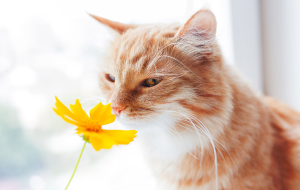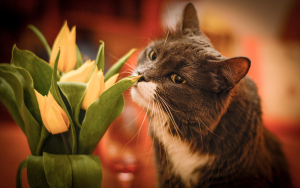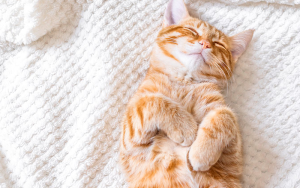What Happens If My Kitten Eats My Older Cat’s Food? Unraveling the Consequences

Introduction
In a multi – cat household, it’s not uncommon for a curious kitten to sneak a nibble or two from the food bowl of its older feline companion. While it might seem like a harmless occurrence at first glance, there can be several implications depending on
various factors. Understanding what could potentially happen when a kitten indulges in adult cat food is crucial for the well – being of both your furry friends.
Nutritional Imbalance for the Kitten
Inadequate Growth Nutrients
Kittens have unique dietary requirements compared to adult cats. They are in a rapid growth phase and need a diet rich in protein, fat, calcium, phosphorus, and other essential nutrients to support their developing bones, muscles, and organs. Adult cat
food is formulated to meet the maintenance needs of fully grown cats, which means it often has lower levels of these crucial growth – promoting nutrients. If a kitten consistently eats adult cat food, it may not get enough of the building blocks it
needs for proper development. For example, insufficient calcium can lead to skeletal deformities, while a lack of high – quality protein might stunt muscle growth.
Excessive Minerals and Nutrients
On the flip side, some components in adult cat food can be harmful in excess for kittens. Adult cat diets may have higher levels of certain minerals like magnesium. While adult cats can handle these amounts, kittens’ kidneys are still developing and may
struggle to process the extra load. Over time, excessive magnesium intake could potentially lead to urinary problems, such as the formation of crystals or stones in the urinary tract. This can cause discomfort, pain, and even urinary blockages, which
are serious medical emergencies for kittens.
Digestive Upset
Sensitive Stomachs
Kittens have more delicate digestive systems compared to adults. Their gut flora is still developing and adapting to the new world of solid foods. Adult cat food often has different ingredients and textures that a kitten’s stomach might not be used to.
When a kitten eats adult cat food, it can lead to digestive upset, manifested as vomiting, diarrhea, or a combination of both. The sudden introduction of unfamiliar proteins, fibers, or additives can disrupt the balance of the kitten’s gut microbiome,
causing distress and an unhappy kitten (and owner!).
Appetite and Feeding Habits Disruption
If a kitten fills up on adult cat food, it may not have the appetite to eat its own specially formulated kitten food. This can further exacerbate the nutritional imbalance issue. Additionally, kittens should be fed more frequently than adult cats due
to their smaller stomachs and higher energy requirements. If they are munching on adult cat food instead, they might not get the regular, small meals they need, leading to inconsistent energy levels and potential growth stumbles.
Behavioral Implications
Food Aggression
In some cases, if a kitten repeatedly accesses the older cat’s food, it could trigger food aggression in either the kitten or the older cat. The older cat may feel threatened by the kitten encroaching on its territory (the food bowl) and become defensive
or even aggressive. Conversely, the kitten might start to view the older cat’s food as a prized possession and become possessive or bratty when it comes to mealtime. This can create tension in the household and disrupt the peaceful coexistence of
your cats.
Social Hierarchy Impact
The act of a kitten eating the older cat’s food can also have implications for the social hierarchy. Cats have a natural pecking order, and food is an important aspect of this. If the kitten is allowed to freely take over the older cat’s food source,
it can send mixed signals about their respective positions in the household. This might lead to other forms of disobedience or challenges to authority from the kitten, causing stress for both cats and making it harder for them to establish a harmonious
relationship.
What to Do If It Happens
Separate Feeding Areas
The simplest solution is to create separate feeding areas for your kitten and older cat. This can be as easy as placing their food bowls in different rooms or at opposite ends of the same room. This way, the kitten can’t casually stroll over to the older
cat’s bowl and helps maintain the integrity of each cat’s diet. You can also use baby gates or other barriers to keep the curious kitten at bay during mealtime.
Monitor and Correct Behavior
If you catch the kitten in the act of eating the older cat’s food, gently but firmly redirect its attention. You can use a distraction like a favorite toy or a small treat to lure it away. Over time, the kitten will learn that it’s not allowed to raid
the other cat’s food. Consistency is key here – don’t let it slide one day and then correct it the next, as this will only confuse the kitten.
Consult a Veterinarian
If you notice any signs of digestive problems, nutritional deficiencies, or behavioral changes in your kitten after it has eaten adult cat food, it’s essential to consult a veterinarian. They can perform a physical examination, run tests if necessary,
and provide tailored advice on how to get your kitten back on track nutritionally and behaviorally.
Conclusion
While it might seem like a minor mishap when a kitten eats adult cat food, the consequences can be far – reaching for its health, digestion, and behavior. By being aware of these potential issues and taking proactive steps to prevent and address them,
you can ensure that both your kitten and older cat thrive in a harmonious, well – fed household.
How can I ensure my kitten gets the right nutrition?
What are the signs that my kitten has an upset stomach?
Should I separate my kitten from the older cats during feeding?







